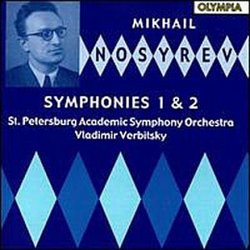| All Artists: Nosyrev, Verbitsky, St Petersburg Academic So Title: Symphonies 1 & 2 Members Wishing: 0 Total Copies: 0 Label: Olympia Release Date: 8/17/1999 Genre: Classical Style: Symphonies Number of Discs: 1 SwapaCD Credits: 1 UPCs: 515524006600, 723723604620, 5015524406608 |
Search - Nosyrev, Verbitsky, St Petersburg Academic So :: Symphonies 1 & 2
 | Nosyrev, Verbitsky, St Petersburg Academic So Symphonies 1 & 2 Genre: Classical
|
Larger Image |
CD Details |
CD ReviewsAn essential disc in understanding suppression upon art! David A. Hollingsworth | Washington, DC USA | 03/11/2000 (5 out of 5 stars) "Mikhail Nosyrev (1924-1981), like Alexander Mosolov (1900-1973), were examples of what the enforcement of Socialist Realism did towards the true principles of art. The principles of art, although not completely destroyed, were nevertheless severely damaged for the sake of conformity to the ideals of Socialist Realism. Shostakovich understood this, and understood well and the reason why Shostakovich was and still is the most eminent of Soviet composers, was that he, although through force, adopted the ideals of Socialist Realism, but on his own terms, with the principles of art cherished even if his life was to be greatly endangered at times! Soviet composers after 1930 were not able to dublicate the defiance of Shostakovich, even in the height of Stalin's purges by 1936. Yes Nosyrev was educated at the Leningrad Conservatory. But he, with his mother and stepfather, were arrested when the composer was 19 years of age and were sentenced for ten years in the Gulag (1943 through 1953). The charge? counter-revoluntionary activities. Therefore, the sentence has damaged the flourishing, the development, of his musical art. His four symphonies, for examples, demonstrate good craftmanship and assurance in musical form. But the ideas lack coherence and flow and fragmentation permeates in places. His arguments suffer and became devoids of depth and uppermost discipline. His music is honest and although there was an expectation for Nosyrev to bring emotionalism to the extreme due to his experience of horror in thr Gulag, Nosyrev avoided those extremes. The sense of tragedy is profound nevertheless, especially in the First Symphony (1965). But that sense of tragedy is controlled and lacks the uppermost horror and schizophrenic writings which made Popov's First, Shostakovich's Fourth, and Myaskovsky's Sixth Symphonies such sensations in their own right. Had his musical ideas been more closely knitted and permeated with greater depth, his symphonies would have joined the league of among the finest symphonies of Soviet Russia, especially after Stalinism. But Nosyrev cannot be wholly blamed for this. Vladimir Verbitsky and the St. Petersburg Academic Symphony Orchestra gave authoritative performances overall while the recording is appropriately atmospheric and opulent. As always, the program notes of Per Skans are well-written and informative. Nosyrev was a good composer, filled with honest intentions and Olympia again lived up to its reputation in allowing us to explore the obscure composers, their works, and the history surrounding them. Recommended."
|

 Track Listings (8) - Disc #1
Track Listings (8) - Disc #1